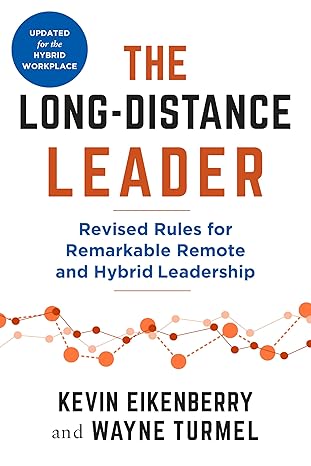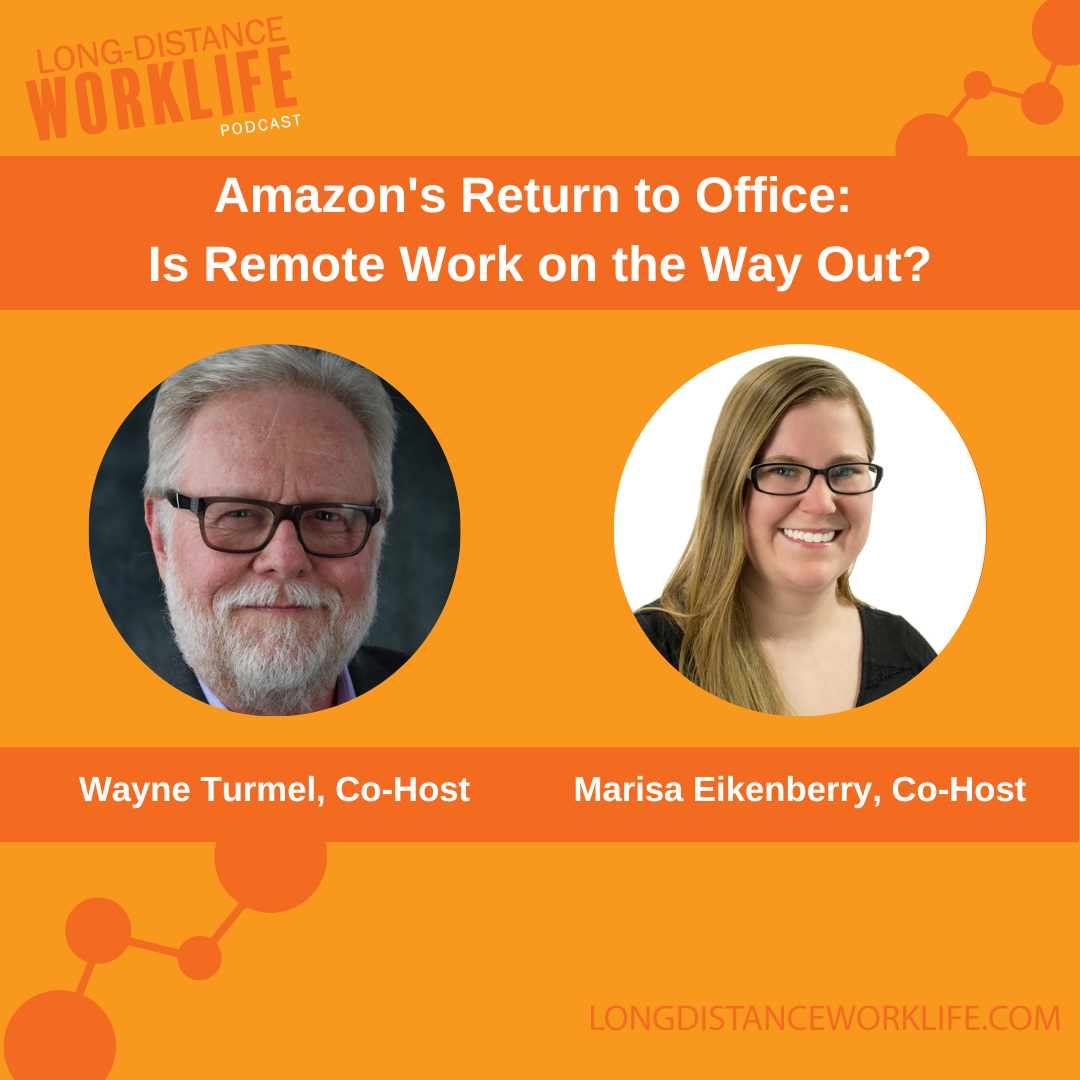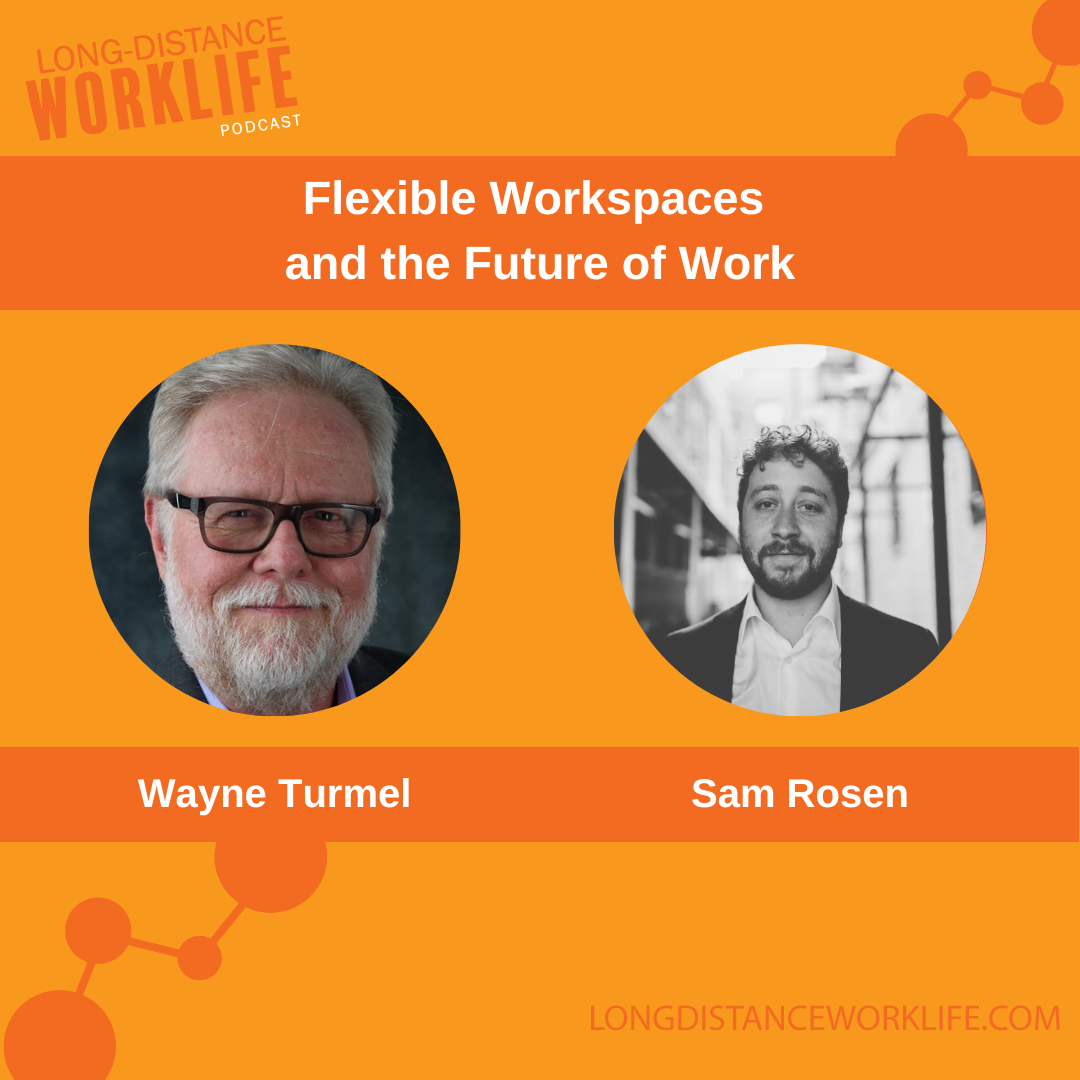Marisa Eikenberry and Wayne Turmel tackle the hot-button issue of Amazon’s recent return-to-office mandate and what it means for the future of remote work. Amazon’s decision to require employees to come back to the office—and its ultimatum of “come back or find a new job”—has sparked conversations about whether this marks the end of the remote work era.
Marisa and Wayne dive into the reasons behind Amazon’s push for office attendance, from massive real estate investments to a company culture driven by performance. They also explore the broader implications for other companies, the financial and cultural challenges that come with hybrid work, and how employees worldwide, like those at Ubisoft in France, are pushing back against such mandates.
Key Takeaways
1. Amazon's RTO Mandate: Why Amazon is forcing employees back into the office and the real estate and management philosophies driving the decision.
2. Is Remote Work Fading?: Why some companies are clinging to old work models, despite the success of remote work during the pandemic.
3. Worker Pushback Globally: How employees, including Ubisoft workers in France, are fighting against return-to-office policies—and what this means for global trends.
4. A Seismic Shift in Work: Why we’re in the midst of a massive change in how companies view work, leadership, and productivity.
00;00;08;03 - 00;00;18;14
Marisa Eikenberry
Welcome back to long distance worklife, where we help you lead work and thrive in remote hybrid teams. I'm. Marisa Eikenberry. And joining me because my co-host and remote work expert Wayne Turmel. Hi, Wayne.
00;00;18;16 - 00;00;21;09
Wayne Turmel
Hi. Hello. That would be me. Hi. How are you?
00;00;21;11 - 00;00;22;27
Marisa Eikenberry
I'm great. How are you?
00;00;22;29 - 00;00;26;15
Wayne Turmel
I am swell. And the great scheme of things.
00;00;26;17 - 00;00;47;13
Marisa Eikenberry
Well, I'm sure you're going to be even more swell. If not, your brain will explode here shortly as we're tackling the big question of. Is this the end of remote work or just the beginning of a new conversation? So one of the things that I know you've been talking a lot about lately is that Amazon just decided that everyone is returning to office.
00;00;47;15 - 00;01;02;04
Marisa Eikenberry
And if you didn't want to do that, well, have fun finding a new job. So why do you think that some companies, like Amazon, are pushing for this full return to office mandates, despite remote work being successful during the pandemic?
00;01;02;07 - 00;01;07;20
Wayne Turmel
Okay, so there's about five things to unpack in that sentence. Things.
00;01;07;23 - 00;01;11;00
Marisa Eikenberry
That's fair. I kind of gave you a loaded question right?
00;01;11;02 - 00;01;38;17
Wayne Turmel
And there was a lot going on. First of all, you know, were we successful during the pandemic? Generally speaking, yes. Work got done. Productivity. Depending on the type of job rose or fell a little bit. People generally got their work done. Why? Because people generally get their work done. There are people who don't, and there are people who will overachieve.
00;01;38;20 - 00;02;15;01
Wayne Turmel
And it all kind of averages out in the great scheme of things. But how does this apply to companies wanting to go back to the blessed before times? And I think there are. And I didn't write this down. So you have to count for me. I think there are three major things going on. Okay. Number one is companies have tons of money invested in real estate, space, equipment, all of this stuff.
00;02;15;03 - 00;02;26;11
Wayne Turmel
And when a CFO or a CEO walks into a building that is 50% empty, they have an immediate, visceral reaction, right?
00;02;26;12 - 00;02;27;06
Marisa Eikenberry
They're not getting water.
00;02;27;06 - 00;02;28;08
Wayne Turmel
On their business.
00;02;28;10 - 00;02;28;29
Marisa Eikenberry
Yeah.
00;02;29;01 - 00;02;56;18
Wayne Turmel
It's not unreasonable because the question is, well, this doesn't make any sense. And here's the problem. If I have kind of negotiated that, you're going to spend three days in the office in two days out, and you can't shrink your footprint because you need space for the people who come in Tuesday, Wednesday, Thursday, if everybody's there those days, you still need as much space as you had before.
00;02;56;20 - 00;02;57;07
Marisa Eikenberry
Right.
00;02;57;09 - 00;03;25;13
Wayne Turmel
So there is a sunk cost factor to all of this. That is not unreasonable. I mean, if we're going to change the way we work, if we're going to change the size of our footprint, we need to reexamine what it means to have an office. And what does it mean to have physical space, and what should that physical space look like?
00;03;25;15 - 00;03;54;26
Wayne Turmel
Which is a really big conversation that is harder to have than, let's get people back, right? Right. It's just it's a big problem that requires heavy thought and radically changing what you do. And business is not primed for that for the most part. The second thing I think, is that it depends on the kind of business that you're in.
00;03;54;26 - 00;04;22;08
Wayne Turmel
And it's funny because Kevin and I are constantly on this list, on these lists of best remote thinkers and all that stuff. And I say that not to say, look at me, I'm on cool lists, but to say that we get lumped in with the four day work week, death to the office. Do your job on the beach kind of people.
00;04;22;08 - 00;04;25;29
Wayne Turmel
And we're really not right.
00;04;26;02 - 00;04;27;26
Marisa Eikenberry
We've talked about this before.
00;04;27;29 - 00;04;53;28
Wayne Turmel
Every business has to examine what it does and how does it serve its clients, and what kind of company does it want to be when it grows up? And you look at a company like Amazon and for all of their cool computers, computer servers and algorithms that torture artists on a regular basis, the fact of the matter is, they are a 20th century horse and buggy business.
00;04;54;00 - 00;05;04;15
Wayne Turmel
Yeah, they have warehouses full of stuff. That stuff needs to go on wagons. The wagons go to people's homes. That's their business, right?
00;05;04;17 - 00;05;05;26
Marisa Eikenberry
Right, right.
00;05;05;29 - 00;05;34;23
Wayne Turmel
And so, you know, an old school approach is not the most unreasonable thing. The third thing I think has to do with the kind of management company you want to be. And what I am going to say is information based on publicly available data. It is not. You know, Jeff Bezos does not need me to tell him how to run a business.
00;05;34;26 - 00;05;37;25
Marisa Eikenberry
Right. Jeff Bezos does not know who we are.
00;05;37;27 - 00;05;45;24
Wayne Turmel
Yeah. Well, but I'm sure his lawyers do, you know, a simple Google search can flag that or.
00;05;45;26 - 00;05;46;19
Marisa Eikenberry
Right.
00;05;46;21 - 00;06;08;05
Wayne Turmel
But here's the thing. Amazon has a management style that they take pride in, which is produce or die. Do as you're told, do what we say, and nobody gets hurt. I mean, that's basically their stock. They have a 150% turnover every year.
00;06;08;07 - 00;06;10;24
Marisa Eikenberry
Oh I'm not sure I really like.
00;06;10;26 - 00;06;42;19
Wayne Turmel
Most of that is in there. Where every staff which are not working remotely anyway. Right. The the number is lower than that for admin and office staff, but it's still a pretty high turnover organization and that's how they choose to operate. They always have as we we in Las Vegas where there is a big Amazon presence, we like to say everybody knows a lot of people who used to work at Amazon.
00;06;42;21 - 00;06;47;05
Marisa Eikenberry
My stepdad used to work at Amazon, but we're in Indianapolis. But yes.
00;06;47;08 - 00;07;11;01
Wayne Turmel
Right. They have high turnover. It's March or die. This is how they choose to operate, and they are free to do so. I mean, it's their business, their rules. Now, you asked a question because I was paying attention. So those are the three things, right? There's kind of this legacy real estate problem, which is tied to CEO ego.
00;07;11;04 - 00;07;21;25
Wayne Turmel
There's what kind of business win. And then there is what's your general attitude towards your people? It was three. And I remember you did.
00;07;21;27 - 00;07;22;19
Marisa Eikenberry
You did.
00;07;22;22 - 00;08;02;18
Wayne Turmel
Yeah. So you have to start thinking about what is this going to mean in the long run? In the short term, along with the announcement that Amazon was going to do this. Announced that they were cutting their management staff by 15% and increasing the number of direct reports each manager would have. Well, it would not be the worst thing if I were at Amazon to say everybody has to come back to the office and 10 or 12% of your managers said, the heck with that, I'm going to find a job somewhere else.
00;08;02;24 - 00;08;13;21
Wayne Turmel
And they go, okay, that's done right? They insist this is not a way of laying off managers.
00;08;13;23 - 00;08;14;28
Marisa Eikenberry
But yes, in any way.
00;08;15;03 - 00;08;35;14
Wayne Turmel
Unintentional. The result is probably going to be about the same that that it also makes sense. You know, if you want to have that in office mentality, divesting yourself of the people who don't share that mentality is probably not a bad policy. I mean, you want people who are going to buy in, right?
00;08;35;17 - 00;08;36;22
Marisa Eikenberry
Of course.
00;08;36;24 - 00;09;04;18
Wayne Turmel
Now, what is this going to mean long term? And this is where you start to look at other companies besides Amazon. You know, Google said, a year ago, year and a half ago. Everybody get your crap back to the office. And there was plenty of pushback to the point where, quite as it's kept more people working there every day than there used to be.
00;09;04;23 - 00;09;13;14
Wayne Turmel
But ain't all that now, you you had sent me, an interesting article about Ubisoft.
00;09;13;17 - 00;09;35;08
Marisa Eikenberry
For the gamers in the audience and the ones that do not know, Ubisoft is a very, very, very large gaming company. If you're familiar with things like Rayman or Assassin's Creed, they make those games. And yeah, to your point, like I saw this article, just the other day that employees in France are actually threatening to strike over return to office mandates.
00;09;35;09 - 00;10;06;03
Marisa Eikenberry
And at the time that we're recording this, that strike has it happened yet? But by the time you're listening to this, if it if the strike goes through, it will have already happened. So I'll be linking to a story from PC gamer about it, and I'm sure there will be updates on it as you're listening to this. But speaking of that, like, you know, we've been talking about Amazon in the US a lot here, but do you think that we're going to see more worker pushback globally against these policies, like what Ubisoft is doing in France?
00;10;06;06 - 00;10;53;24
Wayne Turmel
Well, I think that we are in and I've said this before, and people are rolling their eyes and getting tired of hearing me say it. We are in the middle of a seismic change in what it means to have a job. What does it mean to work for somebody? What does it mean to have employees? Right? All of this stuff is changing probably more dramatically than since the 1920s or 30s, when we got a 40 hour workweek and a five hour or a five day a week, schedule and people commuting this seismic change that nobody really knows where it's going to wind up.
00;10;53;26 - 00;11;17;18
Wayne Turmel
Part of it. And the Ubisoft, Ubisoft, employees. I'm I'm sorry, guys, that it's happening. I'm not surprised that it's happening in France, because France has a long history of work stoppages and using their protest, and certainly much more so than North Americans do.
00;11;17;20 - 00;11;18;15
Marisa Eikenberry
00;11;19;05 - 00;11;51;12
Wayne Turmel
But it speaks to the fact that there is a generational change. There is a change based on the type of work one does. That changes people's relationship with their employer and whether they feel like where the work gets done as important as what work gets done. I mean, if you're a coder and you're spending your time in the dark with your mother shoving food, you under the door and any hour of the day or night, you can get inspired and work on stuff.
00;11;51;14 - 00;11;58;19
Wayne Turmel
Swiping a bag at 9:00 every morning may be of questionable value.
00;11;58;21 - 00;11;59;11
Marisa Eikenberry
Right.
00;11;59;14 - 00;12;32;21
Wayne Turmel
The other thing, and I'm verging on breaking one of our sacred rules at the cabinet. I can very group which is oh, no political. But there is a sense in the workplace right now, and every study is kind of bearing this out. As benefits start to go away for more and more employees. Boeing, for example, just announced its dropping health care for its employees.
00;12;32;24 - 00;12;45;02
Wayne Turmel
People want a sense of being able to earn something or have a perk. And one of the few negotiable bills at this moment is work flexibility.
00;12;45;05 - 00;12;47;06
Marisa Eikenberry
Right.
00;12;47;09 - 00;13;14;09
Wayne Turmel
It's one of the few things that employers. Yeah. Okay. If you want to stay home Monday and Friday, knock yourself out. Are we benevolent? It's a short sighted policy. It's a short sighted policy on the part of the employees. It's a short sighted policy on the part of the employer. But it keeps people from quitting or gives people enough motivation to come and work for you.
00;13;14;12 - 00;13;37;17
Wayne Turmel
But we're in the middle of all of this chaos where it used to be that if you wanted to work in a certain field or something, there was a place that you went and did that. Now you have a few more options about where you work. What I would say about this and I babbled a lot and we've covered a lot of ground.
00;13;37;24 - 00;14;06;22
Wayne Turmel
But let me kind of boil this down to a couple of things for employers. It is going to be a matter of time before you figure out what are the things that are really important to them. What is the return on investment for having these big real estate kind of investments, and what kind of people do they want to attract?
00;14;06;23 - 00;14;27;03
Wayne Turmel
We've said before that, you know, when you say we have flexible work, or remote work, but you need to be in the office once a week. You've really said, I want the best people I can get who live within 20 minutes of the office.
00;14;27;06 - 00;14;30;06
Marisa Eikenberry
Right? You don't really want the best people, right?
00;14;30;07 - 00;14;57;05
Wayne Turmel
I mean, that's which is fine. That was always who they were hiring. But with remote work and the advent of, kind of dispersed work and we've reached this point where, you know, we could hire different people, we could hire a different type of employee, but not if we're not if we're stuck with that old paradigm. It is totally the company's right to do that.
00;14;57;08 - 00;15;29;14
Wayne Turmel
The golden rule, the one with the gold makes the rules right. Now I'm going to say something which is, perhaps unpopular with some of our listeners, which is what will make this work increase. Remote work is that we, as the employees, need to prove that we are worthy of it. We need proof of concept. We need proof that the employer is not giving everything up by letting us do that.
00;15;29;16 - 00;15;42;29
Wayne Turmel
A lot of the arguments that people use about remote work are, well, I want time with my family, I want this, I want that. Well that's nice. Your boss doesn't really care.
00;15;43;02 - 00;15;44;23
Marisa Eikenberry
Right? Right. It does. It benefits.
00;15;45;00 - 00;15;50;28
Wayne Turmel
Employees. Satisfied voices are important only insofar as it affects your work.
00;15;51;00 - 00;15;53;06
Marisa Eikenberry
Well so real quick I'm going to go slightly off on.
00;15;53;06 - 00;15;54;22
Wayne Turmel
It's going to take a while.
00;15;54;24 - 00;15;55;20
Marisa Eikenberry
Okay.
00;15;55;23 - 00;15;56;17
Wayne Turmel
Okay.
00;15;56;19 - 00;16;16;22
Marisa Eikenberry
Oh I think we had a slight delay but I think it's solved now. I was just going to say on the same line as we're talking about, you know, employers and CEOs. A recent survey of CEOs actually suggests that remote work will be dead in three years. What is influencing this belief? Like, is it just wishful thinking?
00;16;16;24 - 00;16;33;03
Wayne Turmel
Mostly it's wishful thinking. I mean, there was a CEO in the UK who was famous for a microsecond for saying what we really need is 20% unemployment. So all these people will remember who they are.
00;16;33;05 - 00;16;36;19
Marisa Eikenberry
I remember us talking about that in a past episode on like.
00;16;36;24 - 00;17;09;08
Wayne Turmel
So there's some of that. Here's what it's going to take. And I don't know who's going to do it. I don't know how they're going to step up when somebody becomes the next Google, when somebody becomes the next big company with a remote first policy. People will start to pay attention on a larger basis. Right now, the companies that are successful remote first are very niche in terms of the industry that they're in, and they tend to be fairly small.
00;17;09;09 - 00;17;29;05
Wayne Turmel
All they tend to be startups. When a company reaches mega status and works in this new way, follows this new God help me, I use the word paradigm, then it will start because people follow the leaders.
00;17;29;08 - 00;17;30;17
Marisa Eikenberry
Right? Right.
00;17;30;19 - 00;17;47;09
Wayne Turmel
And so that's what it's going to take. Somebody has got to really break out of the box. Or remote work is going to continue to team by team, organization by organization. Bit by bit. And it's never going to 100% takeover.
00;17;47;12 - 00;17;49;12
Marisa Eikenberry
Right. Of course. Like we don't expect it.
00;17;49;13 - 00;18;11;12
Wayne Turmel
They're still going to be. Well if you listen to people out there everything is binary right. Either. It's death to the office and burn your ties, and you never have to go back into the office again. Seize the means of production. Or. That was a lovely little experiment. Get your butt back to your desk.
00;18;11;14 - 00;18;12;01
Marisa Eikenberry
That's fair.
00;18;12;07 - 00;18;44;10
Wayne Turmel
And I don't think it's going to be that simple, but our goal in in with this show, and I hope our listeners understand this. Our goal is just whatever the situation is, whatever your situation is, find a way to make it work right. Make some good decisions about your own attitudes, your own behaviors, and your own choices so that you can navigate this crazy changing workplace and keep body, soul, and spirit intact in the weasels away from your ankles.
00;18;44;13 - 00;18;46;04
Wayne Turmel
That's what we're here for.
00;18;46;06 - 00;19;08;00
Marisa Eikenberry
Okay? Right. So, Wayne, thank you so much for this conversation. And there was a lot of stuff that I would have loved to get to, but we do not have time. So probably another show. And before we go, the second edition of the Long-Distance leader is now available. This updated guide is perfect for navigating today's remote and hybrid work environments with new principles and proven strategies.
00;19;08;03 - 00;19;31;08
Marisa Eikenberry
Kevin Barry and Wayne Trammell show you how to lead effectively no matter where your team is located. Don't miss out on the latest insights and exercises designed to boost productivity and morale. Order your copy now! At Long Distance Work life.com/ldl and strengthen your remote leadership skills. Today. And thank you so much for listening to Long Distance Worklife for Shownotes transcripts and other resources.
00;19;31;10 - 00;19;53;25
Marisa Eikenberry
Make sure to visit Long Distance Work life.com. If you haven't yet, subscribe to the show so you don't miss any future episodes. And if you're on Apple or Spotify, please give us a rating and review. Your feedback helps us improve and reach more listeners just like you. Feel free to contact us via email or LinkedIn with the links in our show notes, and let us know you listen to this episode, or suggest a topic for Wayne and AI to tackle in a future episode.
00;19;53;28 - 00;19;59;06
Marisa Eikenberry
We would love to hear from you. Thank you for joining us. And as Wayne, like, say, don't let the whistles get you down.
00;19;59;09 - 00;20;03;02
Unknown
00;20;03;04 - 00;20;04;29
Unknown
Timestamps
0:00 Intro
1:00 Amazon’s Return-to-Office Policy Explained
3:20 Why Some Companies Are Going Back to the Office
5:30 Real Estate and CEO Ego: What’s Really Driving the Mandates
10:00 Global Pushback: Ubisoft and Strikes Over Office Returns
13:00 Is Remote Work Really Going Away?
16:00 What Does This Mean for Employers and Employees?
18:30 Remote Work Isn’t Dead Yet: Final Thoughts
Related Episodes
Additional Resources
- French Ubisoft employees urged to strike over new return to office policy - PCGamer
- 700+ Ubisoft France staff walk out on a three-day strike in dispute over home working and pay - GamesIndustry.biz
- Amazon boss has a brutal response to staffers who don't like 5-day RTO mandate - Fortune
- As Amazon Announces 5-Day RTO, Are Other Employers Rethinking Their Stance? - Forbes
- Learn more about Wayne Turmel
- Email Wayne Turmel
- Connect with Wayne Turmel on LinkedIn
- Learn more about Marisa Eikenberry
- Email Marisa Eikenberry
- Connect with Marisa Eikenberry on LinkedIn
- Purchase a copy of The Long-Distance Leader
- Purchase a copy of The Long-Distance Teammate
- Purchase a copy of The Long-Distance Team
- The Kevin Eikenberry Group
Order The Long-Distance Leader
Perfect your remote leadership skills with the updated edition of "The Long-Distance Leader" by Kevin Eikenberry and Wayne Turmel, featuring new principles and proven strategies for today's hybrid work environments.





